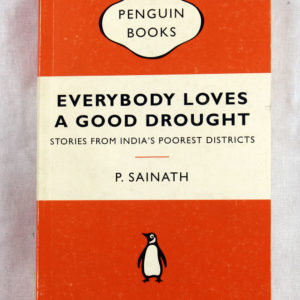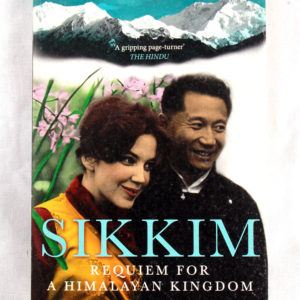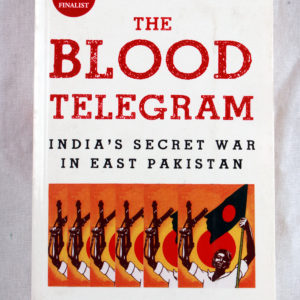The Art of War
₨ 318.00
The Art of War is a book which should be used to gain advantage of opponents in the boardroom and battlefield alike.
- Categories: History, Non-Fiction
- Tags: left books, Sun Tzu, the art of war
Twenty-Five Hundred years ago, Sun Tzu wrote this classic book of military strategy based on Chinese warfare and military thought. Since that time, all levels of military have used the teaching on Sun Tzu to warfare and civilization have adapted these teachings for use in politics, business and everyday life. The Art of War is a book which should be used to gain advantage of opponents in the boardroom and battlefield alike.
Related products
The poor in India are, too often, reduced to statistics. In the dry language of development reports and economic projections, the true misery of the 312 million who live below the poverty line, or the 26 million displaced by various projects, or the 13 million who suffer from tuberculosis gets overlooked. In this thoroughly researched study of the poorest of the poor, we get to see how they manage, what sustains them, and the efforts, often ludicrous, to do something for them. The people who figure in this book typify the lives and aspirations of a large section of Indian society, and their stories present us with the true face of development.
Stretcher-Bearer of Empire
In the pantheon of global liberation heroes, Mohandas Karamchand Gandhi has pride of place. Leaders like Mandela have lauded him as being part of the epic battle to defeat the white regime and prepare the way for a non-racial country. A popular sentiment in South Africa goes: ‘India gave us Mohandas, and we returned him to you as Mahatma’.
Against this background, The South African Gandhi: Stretcher-Bearer of Empire unravels the complex story of a man who, throughout his stay on African soil (1893–1914), remained true to Empire while expressing disdain for Africans. For Gandhi, whites and Indians were bound by an Aryan bloodline that had no place for the African. His racism was matched by his class (and caste) prejudice towards the Indian indentured. He persistently claimed that they were ignorant and needed his leadership, and wrote their struggles out of history—struggles this book documents.
The authors show that Gandhi never missed an opportunity to demonstrate his loyalty to Empire, with a particular penchant for war. He served as stretcher-bearer in the war between Brit and Boer, demanded that Indians be allowed to carry fire-arms, and recruited volunteers for the imperial army in both England and India during the First World War.
Ashwin Desai is Professor of Sociology at the University of Johannesburg. His previous books include South Africa: Still Revolting, ‘We are the Poors’: Community Struggles in Post-Apartheid South Africa and Reading Revolution: Shakespeare on Robben Island among others.
Goolam Vahed is Associate Professor of History at the University of KwaZulu Natal. He writes on histories of migration, ethnicity, religion, and identity formation among Indian South Africans.
This is the true story of Sikkim, a tiny Buddhist kingdom in the Himalayas that survived the end of the British Empire only to be annexed by India in 1975.It tells the remarkable tale of Thondup Namgyal, the last King of Sikkim, and his American wife, Hope Cooke, thrust unwittingly into the spotlight as they sought support for Sikkim’s independence after their ‘fairytale’ wedding in 1963. As tensions between India and China spilled over into war in the Himalayas, Sikkim became a pawn in the Cold War in Asia during the 1960s and 1970s. Rumours circulated that Hope was a CIA spy. Meanwhile, a shadowy Scottish adventuress, the Kazini of Chakung, married to Sikkim’s leading political figure, coordinated opposition to the Palace. As the world’s major powers jostled for regional supremacy during the early 1970s Sikkim and its ruling family never stood a chance. On the eve of declaring an Emergency across India, Indira Gandhi outwitted everyone to bring down the curtain on the 300 year-old Namgyal dynasty.Based on interviews and archive research, as well as a retracing of a journey the author’s grandfather made in 1922, this is a thrilling, romantic and informative glimpse of a real-life Shangri-La.
Drawing on unheard white house tapes, recently declassified documents, and investigative reporting, gary bass uncovers an astonishing story of superpower brinkmanship, war, scandal, and conscience. This is the definitive account of the build-up to the 1971 indo-pakistani war and the birth of bangladesh. In the midst of this cold war cataclysm, the bangladeshis became collateral damage, victims of power games played by nixon, kissinger, yahya khan and even indira gandhi. Revelatory, authoritative and compulsively readable, the blood telegram is a thrilling chronicle of a pivotal chapter in south asian history. Awardspulitzer prize finalista new york times notable book of the yeara washington post notable book of the yearan economist best book of the yeara financial times best book of the yeara new republic best book of the yeara kirkus reviews best book of the year






Reviews
There are no reviews yet.